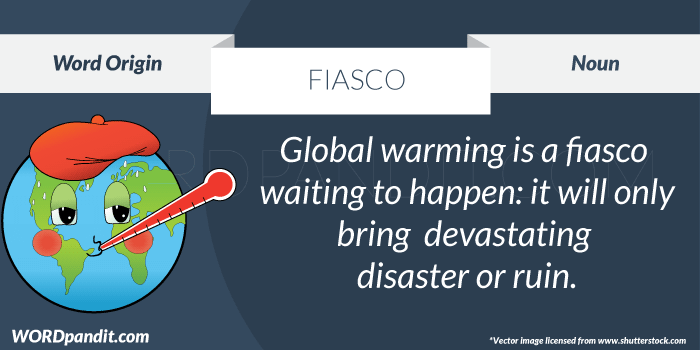Detailed Article for the Word “Fiasco”
What is Fiasco: Introduction
Picture a carefully planned event that spirals into chaos, or an ambitious project that falls apart in spectacular fashion—that’s a “fiasco.” The word conveys more than mere failure; it implies a dramatic unraveling, a collapse that’s often unexpected and memorable. In today’s fast-paced, high-stakes world, understanding the nature of a fiasco helps us make sense of public scandals, personal misadventures, and even global events that don’t go as planned.
Origin and History of the Word Fiasco
The word “fiasco” has its origins in Italian theater, stemming from the phrase “far fiasco,” which means “to make a bottle.” This peculiar phrase became popular among Venetian glassmakers who, when their glassblowing attempts failed, would use the flawed glass to make ordinary bottles instead of fine art. Over time, “fiasco” came to signify a failure or blunder in Italian. When the term entered the English language in the 19th century, it quickly evolved to mean a disastrous or humiliating failure. Today, “fiasco” is widely used to describe events, projects, or actions that go horribly wrong in ways that are often spectacular and public.
Meaning and Definition of Fiasco
Fiasco (noun):
- A complete and humiliating failure, often involving public embarrassment.
- An endeavor that ends in a catastrophic breakdown or chaos.
- (In popular use) A scenario where plans go dramatically wrong in a memorable way.
How to Pronounce Fiasco
fee-AS-koh
How to Remember Fiasco: Memory Tips
To remember “fiasco,” imagine a “fiasco bottle” smashing to the ground—its pieces flying everywhere. Think of a memorable failure that “feels as chaotic” as broken glass. Another tip is to associate “fiasco” with “disaster,” both words suggesting something going drastically wrong in a visible, unforgettable way.
Fiasco in a Sentence: Examples and Usage
- Business: The company’s attempt to launch a new product turned into a fiasco when technical issues emerged on the first day.
- Social Event: The wedding became a fiasco when the catering didn’t show up, and the guests were left without food.
- Political: The policy rollout was a fiasco, facing public backlash and prompting an immediate retraction.
- Sports: Their game strategy was a fiasco, leading to an embarrassing defeat against a lower-ranked team.
- Personal: Her dinner party turned into a fiasco after a series of cooking mishaps left the kitchen in chaos.
- Technology: The software update was a fiasco, causing devices to crash unexpectedly worldwide.
- Academic: The group project was a fiasco due to lack of coordination and last-minute changes.
Difficulty Level of Using Fiasco
Intermediate:
- Commonly used in casual and formal contexts
- Easy to apply with clear associations of failure
- Best used in memorable or highly visible scenarios
Modern Usage of Fiasco in Contemporary Context
In today’s world, “fiasco” is frequently used in news and media to describe high-profile failures, from political missteps to corporate blunders. On social media, the term is used to describe anything from minor mishaps to large-scale disasters, often going viral when a public figure or event goes awry. In pop culture, “fiasco” has even become a humorous exaggeration for small but memorable mistakes, such as a kitchen disaster or a social faux pas. Additionally, industries like technology and entertainment use the word to discuss projects or launches that dramatically miss their goals. “Fiasco” remains a powerful, evocative term that captures the attention of audiences, as it conveys not just failure but also the sense of a public, dramatic breakdown.









Fiasco is a type of glass as well. . .Interesting
fiasco can be remembered with fiat co. complete failure of new car launched by fiat 😉
xD
nice tip to learn by remembering phycho
That is really great , a bulk of information related to various tests that we are giving these days but it would be damn cool if you provide any dictionary , you know some kind of plugin becoz in my opinion everyone wants all information under one flask